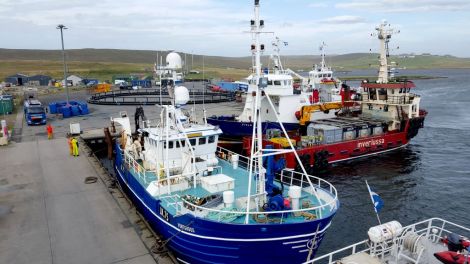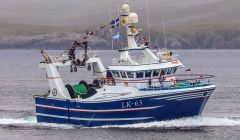Viewpoint / It’s hard to go green if you’re facing the red
IT IS a fact brought back into focus by the war in Ukraine. For decades, governments have promoted and promised a move away from oil and gas, getting ever greener – at least in their messaging – in response to the justified eco-concerns of modern-day voters, writes Daniel Lawson, newly appointed executive officer at the Shetland Fishermen’s Association.
Now energy costs are rising even higher, our reliance on imports is being called into question – and our governments, who only a few months ago hosted the COP26 climate conference in Glasgow – are having to reconsider just how green our society can really afford to be in this moment.
This sharp rise in fuel costs affects us all; every household, every industry. Such remains the scale of our reliance – still – on fossil fuels. The practical reality is that we can’t yet manage without oil and gas. It’s an example that highlights a wider point: it’s hard to go green if you’re facing the red. (A phrase coined by Mike Park OBE, of the Scottish White Fish Producers Association.)
Environmentally friendly statements, plans, policies, and pledges are cheap to make and easy to market. The actual transformation towards a greener society – electric cars and charging points, subsidy for renewable research and development, financing of future fuels, overhauling public transport and foregoing cheap foreign imports for more ‘home-made’ goods and foods – is more expensive, and seemingly slow.
Actively working with others
Shetland’s fishing fleet bucks many national trends – and many widespread assumptions. Our crews are younger, with an average age of 38. All of our vessels participate in KIMO’s Fishing For Litter scheme to responsibly dispose of bruck from onboard. Pelagic nets are recycled, work is underway to find the solution for recycling more complex whitefish nets, and local crews spend increasing amounts of time disentangling discarded nets from visiting vessels – trying to make up for the irresponsible practices of some boats from other countries fishing in UK waters.
Become a member of Shetland News
The industry is actively working with others such as the ORION Clean Energy Project to help research future eco-friendly fuels, and its carbon emissions have been steadily reduced by investment in modern built, fuel-efficient vessels – with 14 new boats joining the Shetland fleet within 10 years. These cleaner engines can cut fuel use and carbon emissions by around 20 per cent compared to the same sized diesel engines of old.
Trying times
Shetland’s fleet has managed to keep fishing throughout the most miserable of modern times: coronavirus lockdowns and local outbreaks, disruption from a badly managed Brexit, restrictive recent fuel prices, and mismatched quotas that threaten the very viability of boats – even at a time when their crews see more fish around Shetland than ever before.
Operating under such dire difficulties – the mounting pressures of fuel costs mixed with quota cuts – has left many vessels ‘in the red’, or struggling to avoid it, stuck between the rock of running at a loss and the hard place of tying up with no income.
Yet they continue to provide a now sadly under-rated service to the nation: fresh, nutritious, wild caught and low carbon food – a secure source of protein in troubled times – plus all of the economic benefit that has sustained our way of life in Shetland for centuries.
Shetland’s shellfish species are some of the only scallop and crab stocks to receive sustainability accreditation from the Marine Stewardship Council (MSC), with stock assessments monitored by scientists from Shetland UHI and vessel numbers restricted accordingly by the unique licensing work of Shetland’s Shellfish Management Organisation.
Modern, responsible, sustainable
Shetland’s fishing industry has these good environmental stories to tell. Yet it is continually condemned by the reckless, rash and purposefully provocative language of extreme environmentalists. Relentless unsubstantiated shouts of ‘overfishing’, ‘unsustainable’ and ‘destroying the seabed’ are too easily accepted as fact, by the public and our politicians, without realising that – in Shetland at least – we have a modern, responsible, and sustainable fishing industry in which we can all take more pride.
Shetland, to its credit, has managed to keep its family-owned fleet – with shareholder crews that instinctively understand the importance of sustainable fishing, to ensure that the next generation can continue to fish. When it comes to more environmentally friendly fuels – fishing crews facing extortionate bills will be the first in line whenever new technology becomes available and can be trusted for long trips at sea.
A greener political pooster
With council elections on the horizon, and three local candidates announced so far by the Scottish Green Party, I wonder to what extent the cornerstone of Shetland’s economy can rely on their support – if elected? Party affiliations aside, it seems likely that any new batch of councillors will possess a generally greener political pooster – in a reflection of our society’s increasing eco-concern.
Scottish Green manifestos have made poor reading for fishermen in recent years, as they have also disturbed salmon farmers, oil workers and crofters alike. It will be interesting to see what leeway local Greens might have to do things differently, and to instead work with local industries – if they can see their merits and accept the meaningful part they must play in Shetland’s cleaner, greener future.
Become a member of Shetland News
Shetland News is asking its many readers to consider paying for membership to get additional features and services: -
- Remove non-local ads;
- Bookmark posts to read later;
- Exclusive curated weekly newsletter;
- Hide membership messages;
- Comments open for discussion.
If you appreciate what we do and feel strongly about impartial local journalism, then please become a member of Shetland News by either making a single payment, or setting up a monthly, quarterly or yearly subscription.













































































